 CNS photo/L'Osservatore Romano
CNS photo/L'Osservatore RomanoVatican City
Pope’s homilies help Catholics fight the good fight, Jesuit says
By CAROL GLATZ, Catholic News Service | Published May 1, 2014
VATICAN CITY (CNS)—Pope Francis’ morning homilies represent a rallying cry and “road map” for today’s Christians in their daily journey to grow closer to God, said the Jesuit editor of a new collection of the homilies from the pope’s early morning Masses.
Each reflection the pope delivers in the chapel of his residence, the Domus Sanctae Marthae, represents the pope unfurling “the map for the spiritual life and pastoral commitment” of the church, Jesuit Father Antonio Spadaro wrote in the introduction of the collection published in Italian by the Rizzoli publishing house.
The papal rulebook, however, doesn’t offer guidance for a “cake walk,” but rather sets the strategy for what’s more like a boxing tournament “where different matches are fought: a round against ‘the prince of this world,’” and others vying for power, the spirit and the pastor fighting for his people, Father Spadaro wrote.
“It’s a fight where people’s well-being is at play, their eternal well-being, eternal salvation,” the pope said in a homily Oct. 11 last year.
The book compiles the Italian summaries and extended excerpts Vatican Radio has produced from the 186 morning homilies the pope delivered between March 25, 2013, and March 20, 2014.
The Masses are not open to the public, but are attended by Vatican employees and guests, including parishioners of the Diocese of Rome, by invitation. While the homilies are recorded in their entirety, Pope Francis has explicitly requested his morning reflections not be broadcast in full and that complete transcripts not be distributed publicly.
Instead, journalists at the Vatican Radio Italian news desk write up a summary of the pope’s brief remarks interspersed with audio clips and additional direct quotes. The Vatican newspaper, L’Osservatore Romano, offers its own summary and Vatican television produces a short news clip of the homily.
Father Spadaro explained in the book’s introduction some of the reasons behind the pope’s decision to not allow the publication of a full transcript of his morning homilies. First of all, he wrote, the pope uses no notes and doesn’t speak from a prepared text. Pope Francis delivers the homily in Italian, which is not his mother tongue. But more importantly, the priest wrote, the pope sees his daily homilies as part of a broader relationship the pastor has with his parishioners—a celebration that is meant to be directly and immediately shared in person as a family, he wrote.
His morning reflections are not individual essays for a book of meditations, Father Spadaro wrote, but are an “encounter between a pastor and his people” where he speaks heart-to-heart to them, spontaneously and informally, but also forcefully. Despite the limited nature of the homily summaries, they still offer the public a clear path and understanding of Pope Francis’ pontificate, he wrote.
The Communications Department of the U.S. Conference of Catholic Bishops is planning to release an English version of the pope’s morning homilies as part of their “Simple Wisdom of Pope Francis” series. More information can be found at www.SimpleWisdomSeries.com.